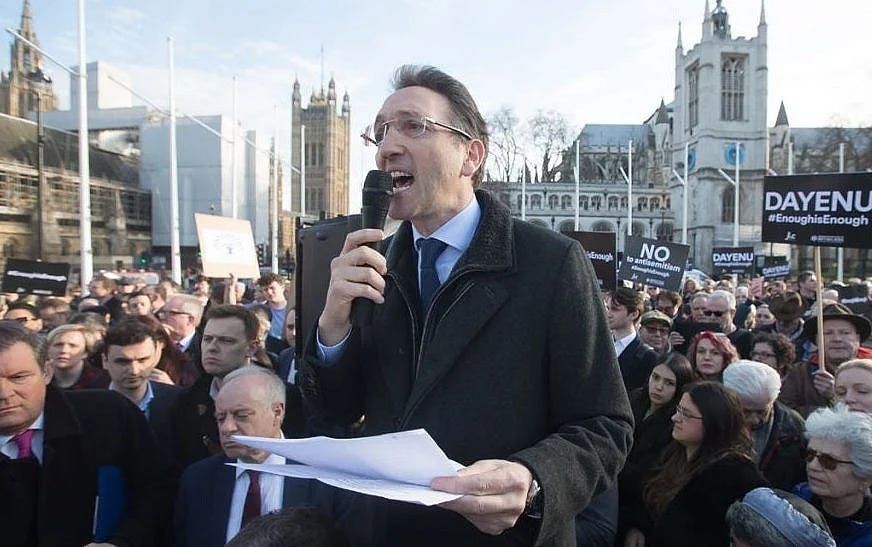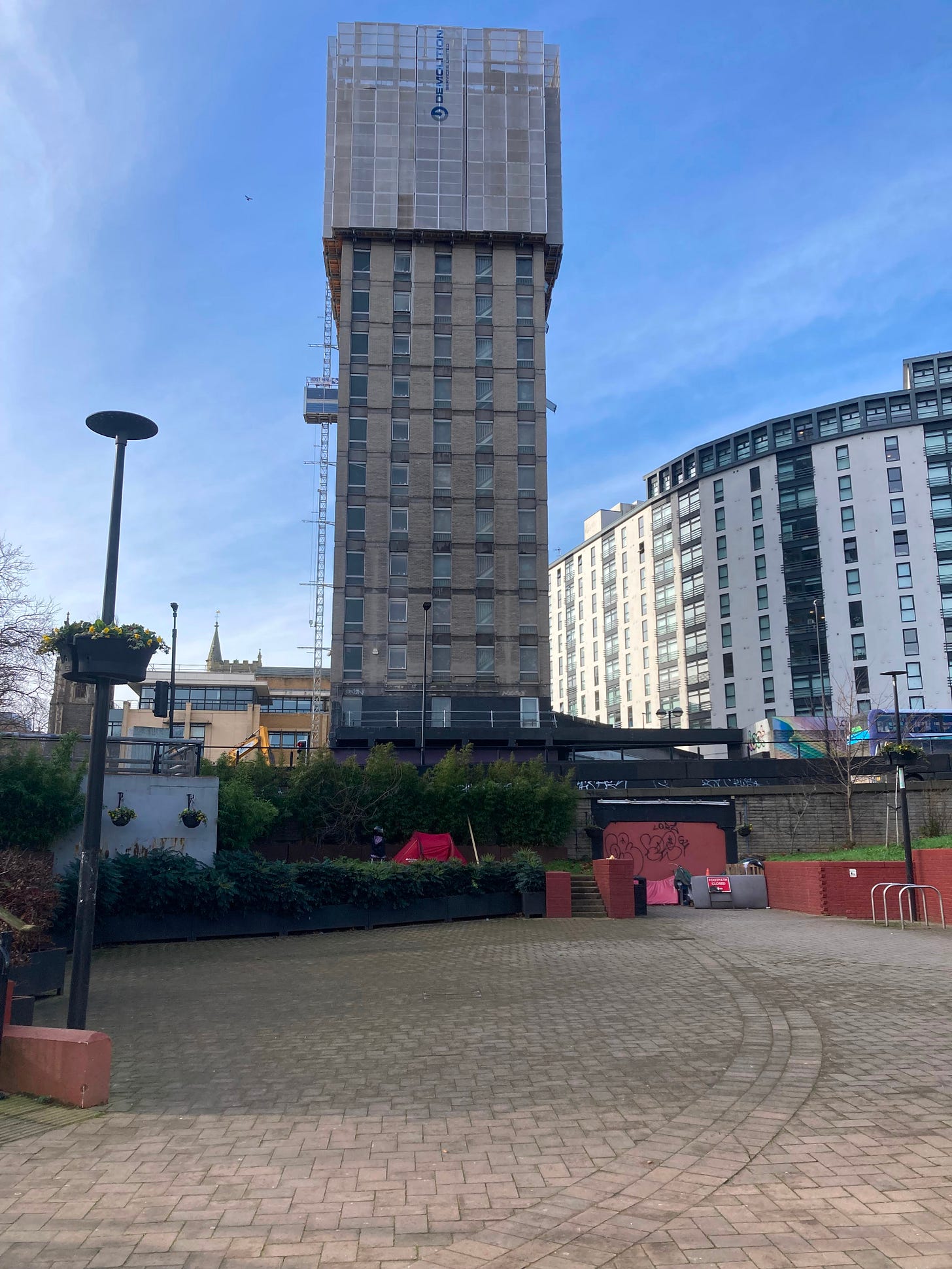How Bristol’s tallest building will be linked to Israel’s atrocities
The relationship between Bristol’s local state, its universities and global property investors is re-shaping the city. The arrival of the city's tallest ever building exposes another dimension.
If you stood in the Bearpit this winter - a sunken 1960s concrete plaza in the middle of St James Barton roundabout in Bristol’s city centre - you would have seen up to a dozen tents pitched on its raised grass sides. As the relentless traffic goes round above like water circling an enormous plughole, you are confronted with the raw end of Bristol’s housing crisis. Tragically, it no longer registers as a shock. Tents like these can be found all over the inner city, from parks to roundabouts to the walls of the cathedral. Beyond the centre, hundreds of battered vans and caravans line residential streets, industrial estates and the avenues of the Downs - homes to the growing mass of people who cannot afford a roof over their head in a place with the least affordable housing of any major British city outside London.
Looking up from the tents at the Bearpit, you see a very different, but equally emblematic feature of Bristol’s housing crisis. Across the road, the former 18-storey Premier Inn, originally built as offices in the 1970s, is currently being demolished floor by floor. In its place will stand two high-rise towers. One of these will be a 28-storey Purpose-Built Student Accommodation (PBSA) block, the other an 18-storey ‘Co-Living’ block - a new housing product similar to PBSA, with small bedrooms and shared amenity spaces, but aimed at young professionals. The larger tower will be Bristol’s tallest ever building, two storeys higher than the Build-to-Rent development Castle Park View, completed in 2022. It will be a defining landmark on the skyline, visible from across the city.
The proliferation of increasingly large PBSA blocks in Bristol has been driven by the huge expansion of the city’s two universities, the University of Bristol and the University of the West of England, in combination with the housing crisis. According to the latest population report from Bristol City Council, there were around 71,000 students registered at the two universities in 2023, a population that had increased by over half in the previous decade. It is projected to increase by around another 20% in the next ten years. A big driver of that rapid expansion are international students, who currently make up around a quarter of all students at the two universities, with the University of Bristol aiming to have 40% of their full-time students from overseas by the end of this decade. Unlike domestic students, their fees aren’t capped, and many universities have pinned their future survival on their money. Already on a rising trajectory, the numbers of international students rocketed after Boris Johnson’s government relaxed visa rules. Brexit saw numbers from the EU reduce but nationally there has been a 59% increase in non-EU students since 2016, with the majority coming from China, India and Nigeria. And according to LaSalle Investment Management, international students in the UK are 60% more likely to reside in PBSA than domestic students.
This steep rise in student numbers has run up against a severe undersupply of student housing stock, in cities that are already experiencing major housing crises. The failure to build social housing means that there are now more than 22,000 households on Bristol’s ever-growing council housing waiting list. The private rented sector that these people and the students are competing in, is also shrinking, with buy-to-let landlords leaving the market. Prices for PBSA are consequently incredibly high and growing.
According to recent research by CBRE, Bristol is the most expensive city for PBSA outside of London, and has an average price for a student bed space ranging from £335-£382 per week, only just behind London, which averages £325-£433. Soaring rents make these housing products even more attractive to the institutional investors and corporate landlords that have become the key players in the property-led regeneration model shaping many of Britain’s cities. As the writer and housing activist, Isaac Rose, explains in his recent book, The Rentier City: Manchester and the Making of the Neoliberal Metropolis:
"Purpose-built student accommodation (PBSA) and co-living are both types of apartments that are characterised by low build standards and high yield. They can circumvent minimum space standards - structured more like hotels, with living spaces below what would be allowed for ordinary rental accommodation, as multiple non-related adults share a single living space with rooms off the side of it. PBSA is looked on as “asset class” investment on the part of institutional investors - with return on investments well over 10% and sometimes up to 20%.”
Stricter rules were brought in at the start of 2024 on international students bringing in dependants and getting work visas, but there is no sign yet of a slowdown in the student property boom. The real estate consultant Knight Frank’s PBSA report for the third quarter of 2024 showed that total PBSA investment in the UK for 2024 had reached £3.3bn by that point in the year, significantly more than the £2bn recorded at the same point the previous year. It also highlighted the UK market’s particular allure for international investors, with the UK accounting for 46% of total global capital flows into PBSA worldwide.
Knight Frank’s PBSA report for the second quarter of 2024 showed that Bristol had the highest number of PBSA beds in the development pipeline of any UK city outside London, with 4524 beds with planning submitted, 4779 with planning consented, and 3921 under construction.
Olympian Homes, a developer that specialises in large-scale Build-to-Rent, PBSA and Co-Living developments, was granted planning permission by councillors for the scheme beside St James Barton roundabout in March 2024.
Cain International
In October 2024, it was announced that Cain International, a global real estate investment firm, would be partnering with Olympian Homes to fund the construction of the development. This was no great surprise, as they had partnered previously in 2023 on a £150 million funding deal to build two huge PBSA schemes in York and Leeds. At 45 storeys, the Leeds project, Cirrus Point, will be the tallest building in Leeds and the tallest PBSA building on the planet.
Cain International hold around $17 billion in assets under management through their real estate equity, credit, and private equity platforms. Their global portfolio includes residential, hospitality, commercial, mixed-use developments and what they call “leading brands”, such as One Beverly Hills, a $5 billion project that will see the two tallest towers built in Beverly Hills, California. The 17.5 acre mixed-use site will include the Beverly Hilton, the Waldorf-Astoria Beverly Hills, and an Aman Hotel, Residences and Club complex. This is ultra-luxury, for the wealthiest people in the world. Similar Cain-backed developments can be found in the oil-rich Gulf States. But the appeal of the more pedestrian European student market is increasingly strong too for large private equity investors, rated as a solid and secure source of revenue in uncertain times.
This has been reflected in Cain’s creation of a new management role focussed on this area specifically, with Oliver Cummings appointed as Managing Director, Head of PBSA, Europe, in June 2024. Arvi Luoma, who leads Cain’s European equity strategies, said in the company’s press release at the time:
“Oliver’s appointment marks a crucial step in advancing our European equity strategy, specifically within the living sector. His expertise in PBSA across our target geographies will be vital as we aim to build a premium portfolio of 10,000 student beds within the next five years and further establish Cain’s presence in this growing asset class.”
Jonathan Goldstein and the Israel lobby
The Bristol scheme - originally called St James Square in the planning application, but now being referred to by the developers as St James House - has received quite a lot of coverage in the local press due to its size. What hasn’t been discussed is who will be profiting from it. Cain International was co-founded in 2014 by Jonathan Goldstein, who remains the CEO of the company. Along with his business interests, Goldstein has been one of the most prominent figures of the UK Israel lobby in recent years, holding the powerful position of Chair of the Jewish Council of Leaders (JCL) from 2017 to 2022. The JCL is the umbrella organisation for 36 charities and institutions that represent various aspects of Britain's Jewish community, including the Board of Deputies of British Jews and the Community Security Trust. It also includes the Zionist Federation of Great Britain and Ireland, a body central to the very creation of Israel, and which describes itself as the UK’s leading Israel advocacy organisation.
During his time as Chair, Goldstein was a leading critic of the then Labour leader Jeremy Corbyn, who had long been an advocate for the rights of the Palestinian people. Following the failure of the parliamentary coup against the veteran left-winger from his own MPs in 2016, an alliance between the Labour Right, the Israel lobby and other reactionary forces in the country set out to destroy Corbyn politically by weaponising the issue of antisemitism, which had largely been identified in the rancid social media use of a tiny fraction of the Labour party’s members.
While genuine examples of antisemitism could be found there, the false equivalence between criticism of the State of Israel and antisemitism was turbo-charged. In March 2018, prior to a demonstration outside Parliament organised by the JCL, Goldstein claimed that Corbyn was a “figurehead for an anti-Semitic political culture based upon obsessive hatred of Israel, conspiracy theories and fake news, and that is doing great harm, not just to the Labour Party, but to Britain in a wider sense”.

Later that year, he spoke about Corbyn as being “un-British” and his leadership of the Labour Party as an “existential threat to our community”. And his attacks did not stop following the end of Corbyn’s period as Labour party leader in 2020. On 11 June 2021, Goldstein tweeted : “Repeat after me. @jeremycorbyn is an unrepentant anti-Semite.”
Mentor
Goldstein began his career as a high-flying solicitor at the London law firm Olswang. His subsequent move into both the worlds of real estate investment and the leadership structures of Britain’s Jewish community was heavily influenced by the businessman Gerald Ronson, who Goldstein has described as an “unparalleled mentor”. Goldstein joined Ronson’s Heron International - a global property development firm - in 2007 as managing director, later becoming deputy CEO. In 2010, Ronson Capital Partners - a real estate private equity investment fund - was founded, and Goldstein was appointed CEO.
Gerald Ronson had taken over his father’s furniture business in the 1960s, moved into property development and petrol stations, and by the early 1980s had turned Heron into one of the largest private companies in the UK. He had also founded The Group Relations Educational Trust (GRET) in 1978, an umbrella organisation for militant, street-fighting anti-fascist groups, including his own outfit, the 62 Group. Seeking to establish a more respectable footing, this morphed into the Community Security Organisation and was part of the Board of Deputies of British Jews.
Ronson hit trouble in 1990 when he was convicted for his involvement in the notorious Guinness share-trading fraud. Found guilty of one charge of conspiracy, two of false accounting, and one of theft, he was fined £5 million and given a one-year jail sentence. According to Ronson, while in Ford Open Prison in West Sussex, he received a supportive phone call from the then Israeli Prime Minister Yitzhak Shamir. Shamir was a former leader of Lehi, the Zionist terrorist group who murdered the most senior British official in the Middle East, Lord Moyne, in 1944, and helped carry out the infamous Deir Yassin massacre of Palestinian villagers four years later that accelerated the original Nakba - the forced expulsion of around 750,000 Palestinians from their homes. While on day-release from Ford Open Prison for a medical examination, Ronson also met with Benjamin Netanyahu, who was a minister in Shamir’s government at the time.
More trouble followed for Ronson as his business empire collapsed in the mid-1990s, but after being propped up by loans from figures such as Bill Gates and Rupert Murdoch, his fortunes revived. During the same period, he established the Jewish Community Security Trust in its current form and became its chairman. The charity’s stated mission is to combat terrorism and antisemitism. It produces reports on antisemitic incidents and discourse, advises the Home Office and receives government funding. However, one of its activities is also to counter the Boycott, Divestment and Sanctions (BDS) movement that seeks to put pressure on Israel for its apartheid system and its occupation of Palestinian land in contravention of international law. It has attacked political figures such as the former Conservative Foreign Office minister Alan Duncan, when they have criticised Israel’s illegal settlements in the West Bank and the violent displacement of Palestinians.
Friends of Israel
In 2017, at the start of his tenure as Chair of the JCL, Jonathan Goldstein travelled to Israel to meet with several senior Israeli figures, including Gilad Erdan, then Minister of Strategic Affairs in Netanyahu’s government. Erdan - who has become familiar as the belligerent ambassador to the UN during the assault on Gaza - was then in charge of efforts to undermine Palestine solidarity activism and the BDS campaign in particular. Like the Community Security Trust, the JLC has taken an active role in fighting the BDS movement. Goldstein himself wrote in 2019 that the movement was dishonest and antisemitic.
The year before Goldstein’s visit, Erdan’s ministry had been managing the London Israeli embassy official Shai Masot, whose covert activities were exposed in an undercover investigation by Al Jazeera. Masot, believing he was meeting with someone who would help him in his attempt to establish a group called ‘Young Labour Friends of Israel’, was recorded talking about his wish to “take down” British MPs he considered hostile to Israel, such as Alan Duncan.
Goldstein stood down as Chair of the JCL in 2022 but has remained a prominent pro-Israel voice. Immediately after the horrific 7th October Hamas attack - in which around 1,200 Israelis were killed (though some by the IDF) and 251 taken hostage - he wrote an article for the Times of Israel, titled ‘Loud, proud, and uncompromising, I stand with Israel’. In it he wrote: “To me, it’s clear: we must give our unstinting and total support to whatever action Israel determines in its absolute discretion as an appropriate response to this atrocity…whatever Israel decides is good with me.”
In mid November 2023, he appeared on Piers Morgan’s ‘Uncensored’ TV show. According to UN figures from the time, over 11,000 people in Gaza had been killed by this point of the Israeli onslaught, 68% of them women and children. Goldstein was on the show to discredit the large demonstrations taking place in Britain against the bloodshed. He justified the Israeli destruction of civilian life and infrastructure with the still unsupported claim that “the main nerve centre of the Hamas leadership is under a hospital.”
The scale and gravity of Israel’s actions in Gaza were outlined last week by the Israeli historians Amos Goldberg and Daniel Blatman - both scholars of the Holocaust - in an article published for the Israeli newspaper Haaretz, titled ‘There’s No Auschwitz in Gaza. But It’s Still Genocide’:
“It is estimated that nearly 47,000 people have been killed in Gaza and over 110,000 injured. The number of those buried under the rubble may never be known. The vast majority of the victims are noncombatants. According to the United Nations, 90 percent of Gaza's population have been displaced from their homes multiple times and are living in subhuman conditions that only increase mortality levels. The murder of children, starvation, destruction of infrastructure, including that of the health care system, destruction of most homes, including the erasure of entire neighborhoods and towns such as Jabalya and Rafah, ethnic cleansing in the northern Strip, destruction of all of Gaza's universities and most cultural institutions and mosques, destruction of government and organizational infrastructure, mass graves, destruction of infrastructure for local food production and water distribution – all these paint a clear picture of genocide. Gaza, as a human, national-collective entity, no longer exists. This is precisely what genocide looks like.”
Seemingly true to his word, I’ve been unable to find any public criticism of Israel’s actions from Jonathan Goldstein. He may well agree with the current British Foreign Secretary, David Lammy, who has famously refuted the idea - on the floor of the House of Commons - that a genocide has taken place in Gaza. But then the two have history. Goldstein helped fund Lammy’s unsuccessful bid to be the Labour candidate for Mayor of London in 2015.
Running that campaign was David Mencer, a former director of Labour Friends of Israel and a former ‘Executive Director to Gerald Ronson’ at the Community Security Trust. Mencer is now a spokesman for the Israeli government and has become a familiar presence on British media outlets during the assault on Gaza, aggressively defending the genocidal actions of the IDF.
Menora Mivtachim: Israeli finance shaping Bristol’s skyline
While the London-based Cain International is led by a leading British member of the Israel lobby, Bristol’s tallest building will also be directly financed - and profited from - by Israeli capital. Cain International announced in September 2023 that they were going into a partnership for their UK PBSA investments with Menora Mivtachim, one of Israel’s largest financial companies. Headquartered in Tel Aviv, they are an asset manager with over $90 billion in assets under management. Specialising mainly in pensions and insurance, they have diversified into European real estate in recent years and their partnership with Cain is their first foray into PBSA.
In a press release in September 2023, Nir Moroz, CIO of Menora Mivtachim, said:
“The international appeal of the U.K.’s universities, combined with a supply-and-demand imbalance and opportunity to partner with reputable developers, made this forward funding deal a compelling opportunity to enter the U.K. PBSA market. We look forward to further building our relationship with Cain as these assets reach completion.”
According to Who Profits, an independent research centre dedicated to exposing the commercial involvement of companies within the Israeli military-industrial complex, Menora Mivtachim have helped fund property developments in the occupied territories of the West Bank and East Jerusalem. They also helped finance the construction of the Israeli military’s vast City of Training Bases in the Naqab desert. They are deeply embedded in the Israeli economy more widely and a major shareholder for many Israeli companies, including those that deliver infrastructure projects for the military.
In November 2024, as the slaughter in Gaza continued into its second year, Cain International announced a deepening of their financial relationship with Menora Mitvachim, focused on UK student accommodation:
“Building on the strength of their existing partnership, this new commitment will drive the development of high-quality PBSA projects and strategic acquisitions across key university cities in the UK. The platform already includes a portfolio of assets strategically located in major Russell Group cities such as Manchester, Leeds, York, Liverpool, and Nottingham, developed in collaboration with Olympian Homes and Fusion Students. Most recently, the firm expanded its footprint with the acquisition of St James House in Bristol, bringing the total gross development value (GDV) of the portfolio to over £800 million.”
The press release for this announcement on Cain’s website features a CGI image of the Bristol development, clearly suggesting that this new funding package will go directly into the construction of the two Bristol towers. The announcement of the deal on Cain’s LinkedIn page - which again had an image of the Bristol scheme alongside it - was responded to by another senior figure at Cain with ties to the Israeli state. Writing in a comment beneath the post, Yoni Zlotogorski, the Cain executive responsible for ‘Business Development and Capital Raising’, wrote to thank partners at Menorah Mitvachim:
“Really exciting to see how our partnership continues to grow! Congrats and thanks to Sheery Kishon, Gadi Ben Haim and Nir Moroz for all that’s come to fruition thus far and everything that the future holds.”
A look at Zlotogorski’s LinkedIn profile reveals that he worked for foreign policy think tanks and the Israeli embassy in London before moving into the world of finance. He also worked briefly as an intern at the White House in 2010, in the office of the Chief of Staff to then Vice President, Joe Biden.
A long way from Jerusalem
Last month, a Bristol City Council committee considered an Olympian Homes planning application for changes to be made to the approved plans for the St James House ‘Co-Living’ tower. In a typically cynical move, the developer was seeking a reduction in communal amenity space on each floor, the removal of balconies, and an increase in the number of beds. The proposed changes were recommended for approval by the council’s planning department but councillors deferred the decision to gain a better understanding of the implications for the physical and mental health of future residents of the building.
At the same meeting, another developer’s 22-storey PBSA tower in the emerging Temple Quarter regeneration zone was unanimously approved. This block will be one of several next to the University of Bristol’s new £500m Enterprise Campus, which will combine academic research and business development with a focus on digital tech, engineering and what they’re calling “social innovation”. It’s scheduled to open in 2026. As well as assistance from former Bristol mayor Marvin Rees in the acquisition of land and the favourable disposal of neighbouring sites (he was immediately given an honorary professorship by the university on leaving office), vast amounts of public money are flowing to the project. £35 million has been provided by the West of England Combined Authority for the Quantum Technologies Innovation Centre, while almost £10 million will be spent by Bristol council on building a 400-metre walkway along the harbourside to the new campus. Meanwhile, students remain exempt from council tax, and the city council - on the verge of bankruptcy - is consulting on becoming the first local authority in the country to limit bin collections to once every four weeks.
The local state has been very willing to facilitate the expansion of the universities, which has intensified the housing crisis in a time of falling living standards for the majority of its citizens. With the institutional investors of rentier capitalism moving in to profit from that crisis, purpose-built student accommodation has become the dominant architectural form in the city. The bland, ‘anywhere’ design of these buildings is reflective of their function as vessels for faceless global capital. But what if you do actually put a face to that capital? And what if that person is the uncompromising supporter of a genocidal state? And what if their investor partners for the city’s most prominent building are embedded in the military-industrial complex of that genocidal state?
In January, Bristol City Council passed a motion requiring the council to divest from companies linked to Israeli war crimes. But even if that has any meaningful impact, it seems unlikely any similar action could be expected to impact property investors unless they were doing deals over council-owned land. And the University of Bristol remains content to partner with a wide range of defence contractors, some of whom - namely BAE and Rolls-Royce - have provided parts for the F-35 stealth fighter jets used in Israel’s destruction of Gaza. The combined value of all the university’s military partnerships, according to Demilitarise Education, is worth £92 million.
If they know who their extortionate rent is going to, how will future students and their ‘co-living’ neighbours feel about living in these towers by St James Barton roundabout? They should have our sympathy. Facing limited options, minimal space standards, lack of privacy - with all of today’s intense pressures on top - it won’t be all fun and games. The views from the rooftop terraces will undoubtedly be fantastic. Just as long as you don’t look down at the homeless in their tents below. Or think about the dead and maimed children of Palestine.










